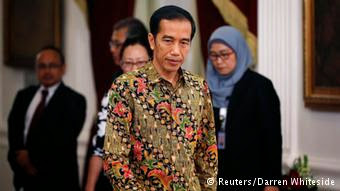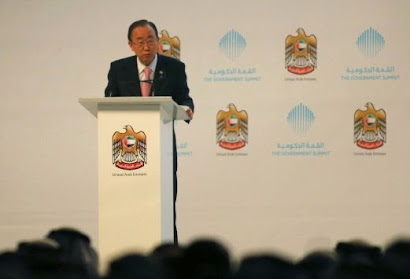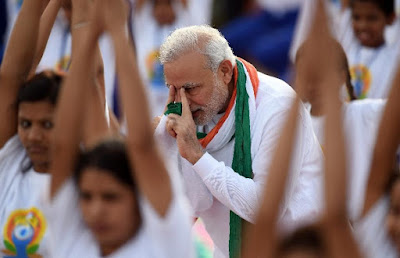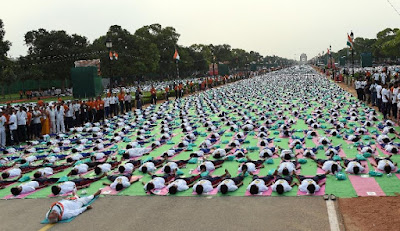Jakarta Globe, Nadia Bintoro, Jun 28, 2015
Tabanan,
Bali. At a time when life is more fast-paced than ever, where everything
demands to be attended at once, it is refreshing at times to just switch off
and go inward to listen to the one that needs attention the most — ourselves.
Located in
Tabanan, about a one hour drive from Denpasar, the Bali Silent Retreat offers
the perfect place to do so. As the name suggests, Bali Silent Retreat creates a
safe haven to enjoy the art of silence and nothingness amidst the scenic view
in the slopes of Mouth Batu Karu.
 |
| Reading a book in silence at the common lounge |
Accommodation
varies and scattered across the land in between the vegetable & herb
garden, meditation bale and labyrinth walk. The wooden bungalow at the front
offers complete privacy and solitude, while the single rooms creates
comfortable private spaces with an open back door view leading to the jungle.
And for
those who enjoy the company of others, separate dormitories of eight for men
and women are available. All buildings are constructed from recycled timbers in
indigenous architectures that speak true to the retreat’s green principle.
Non-denominational
and non-religious, there is no daily schedule of practice set in Bali Silent
Retreat. No strict rituals or chanting to be done. Visitors are free to roam
around, take part in yoga or daily meditation and venture into the labyrinth
and jungle for personal meditation. Only one rule remains: all must be done in
silence.
I woke up
on my first day at the wee hours of 6 a.m. to take part in the morning
meditation. Amidst the early morning fog, a majestic view of Mount Batu Karu on
the horizon greets me. A golden mass of rice paddies ready to be harvested
spread as far as my eyes can see. The local farmers start their work for the
day. Our eyes met, and they smiled. This majestic view and this humble morning
ritual itself is enough to bring serenity and calm into my mind.
Breathing
deeply, I made my way cutting through the dense vegetation that embraces the
retreat pathway into the Octagon Bale where the meditation takes place.
Shaped
following the sacred geometry, the Octagon Bale is an open space that hosts the
“regular” morning and evening yoga and meditation. Both activities are done
under guidance of instructors and are targeted for beginners. Yoga varies from
hatha yoga to creative flow yoga that aims to restore and rejuvenate. While
meditation technique ranges from mindful meditation, contemplation, to chakra
balancing to balance energy and spirit.
Further
down the bale, an unusual set up of labyrinth is available for personal
meditation. A highly personal experience, the labyrinth walking mediation is a
chance to connect within, to ask questions and receive answers. The practice is
found in just about every major religious tradition in the world and can be
found in all over the world, including throughout Africa, South America, India,
Europe, Indonesia, Egypt and North America.
The
labyrinth in the Bali Silent Retreat is rather a small one of seven circuits
and said to be the only labyrinth meditation available in Bali.
 |
| The retreat surrounded by ricefields |
An ancient
practice, the labyrinth meditation is said to induce receptive states of
consciousness. When you walk a labyrinth, you meander back and forth, turning
180 degrees each time you enter a different circuit. As you shift your
direction, awareness is also shifted from right brain to left brain which
induces heightened consciousness.
Perhaps,
it’s the lush trees, perhaps it’s the fresh open air, but I do feel a sense of
freedom as I reached the inner center of the labyrinth and decided to stay
there to just soak all the feelings.
And for
more restful contemplation, participants can also opt to walk the jungle path
that leads the way to the actual village jungle (and with the risk and the
thrill of a jungle, including encountering spiders and rat snakes). Another
more convenient option would be to join the impromptu rice paddy walk or garden
jungle tours that happen serendipitously depending on the availability of the
volunteers. These events provide not only the chance to gain more knowledge
about the retreat, the village and culture of Bali, but also chance to break
the silence for a bit. During these walks, participants are allowed to engage
in conversation and ask question to the tour leader as long as it take place outside
the retreat compound.
A garden
tour provides a great way to understand how the retreat operates. Though
resort-like, the retreat is not-for-profit and employs green-measures to the
extreme.
“The planet
has taken care of us, and thus we need to take care of the planet,” Patricia
Miklautsch, the founder of Bali Silent Retreat, said on the philosophy.
Together with Sangtu, a Balinese naturalist and co-founder of the retreat, they
ensure every component of the retreat employs the most sustainable system as
possible.
“All the
electricity is generated from solar panel, while the water is derived from
water distilling or from the spring. And all the vegetables and herbs are
coming from our very own garden jungle. They are being harvested and consumed
within three hours, so they’re always fresh,” explained Sangtu. “In a sense,
it’s a also a meditation in itself; to know where it comes from and to be
conscious on your consumption, be it electricity or food.”
Food is
indeed an integral part and one of the major factors which keep the visitors
silent in awe. In a garden-to-table style, head chef Simon Jongenotter, along
with the five kitchen angels prepare daily buffet of vegetarian lunch and
dinner. A practitioner of slow food and conscious eating, Jongenotter introduces
“new earth cooking” as a food philosophy in the retreat which entails taking
responsibility for sourcing, preparing and eating food in unique and healthy
ways. The philosophy is translated into vibrant and healthy meals that keep the
guests dedicated in their silence as they keep munching and munching.
Eleonora, a
guest from Netherlands shared her experienced: “I loved the peace and quiet
combined with yoga and meditation and the food — loved the food; so much
variation and never a ‘dull’ meal. My mind is so much more calm and clear, now
and the wonderful nature filled my heart with happiness.”
Just like
Eleonora, given the absence of distraction, I found myself eating and walking
more slowly, noticing the simple movement as the birds flying around which I
usually don’t do. And after the third day, it’s apparent that the life in
silence is all round rewarding and I began to wish it could last forever.
“That is
what happens. People come here, originally for one or two days, and they
extend. What I wish is for more people to open their heart to the retreat by
making it affordable,” Patricia said smiling.
The saying
goes “only in silence can you hear yourself.” In the Bali Silent Retreat, I
heard wind gushing, cicada’s singing and birds chirping, and there, I found peace.





















